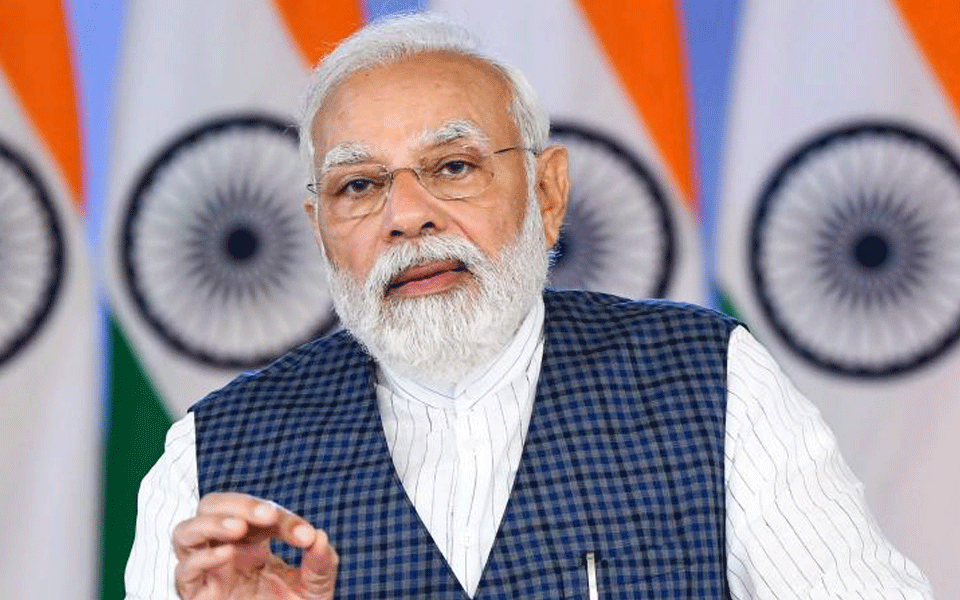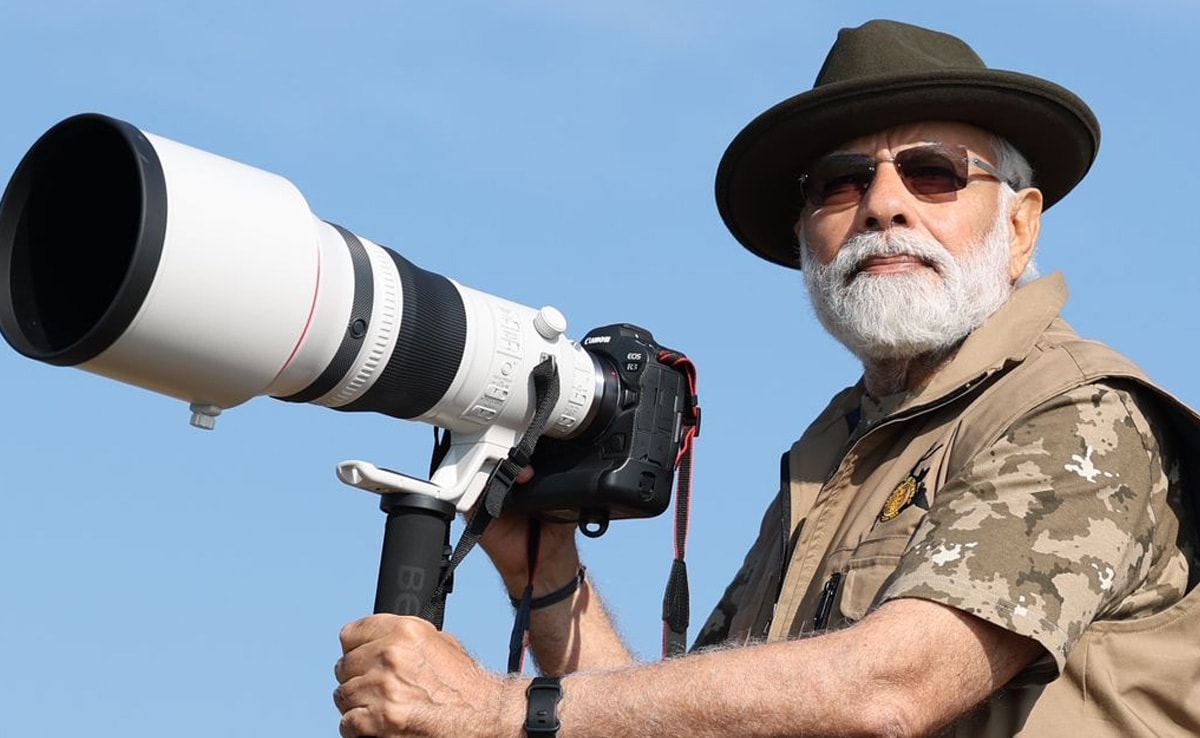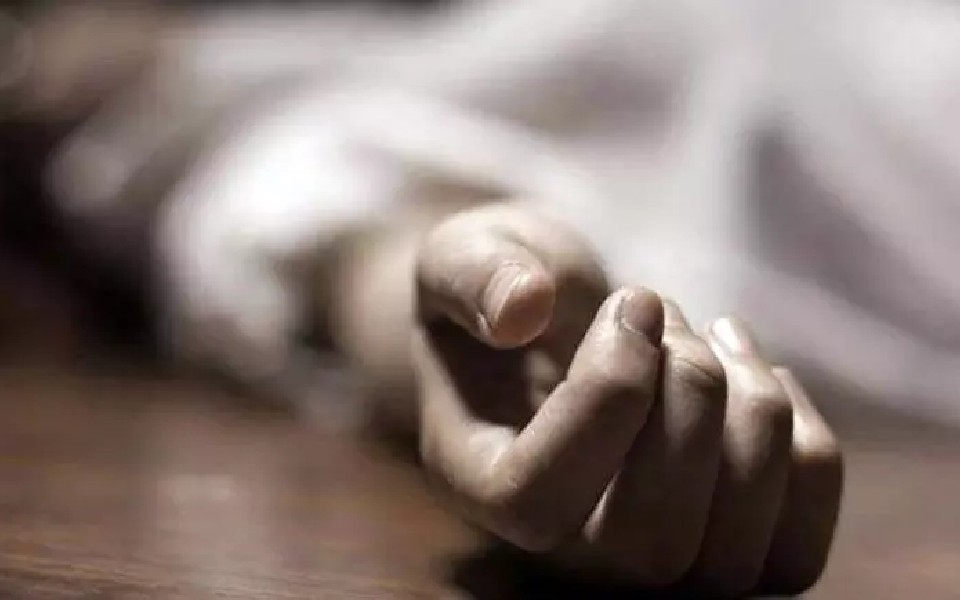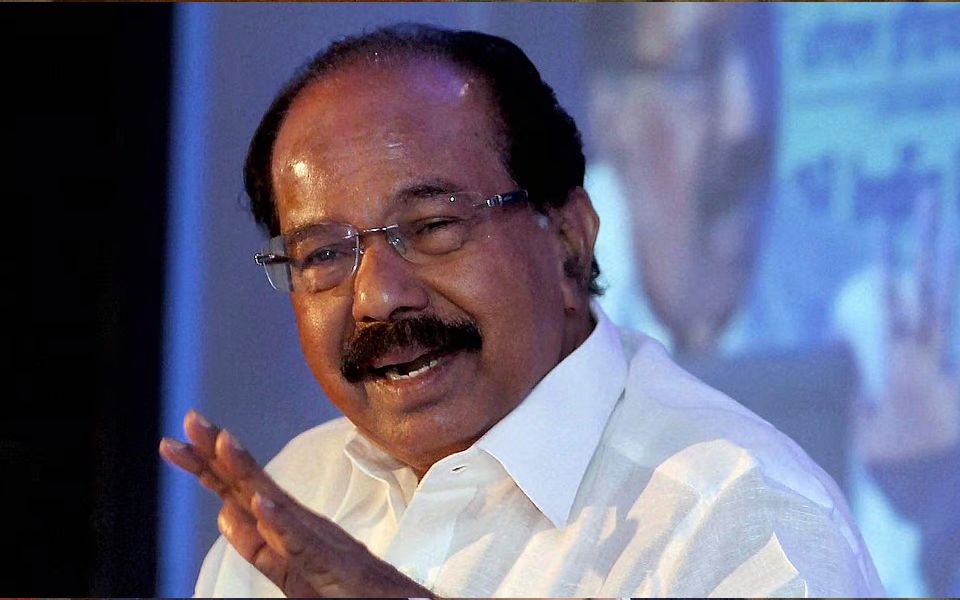Urban Naxals had stalled work of Sardar Sarovar dam for years claiming it is bad for environment: PM Modi
Ahmedabad (PTI): Prime Minister Narendra Modi on Friday alleged that "urban Naxals and anti-development elements" with political backing had stalled the construction of Sardar Sarovar dam on the Narmada river in Gujarat for many years by running a campaign that it would harm the environment.
Such "urban Naxals" are still active and getting support from various institutions to stall development projects in the name of environment protection, Modi said while urging environment ministers from different states to ensure that projects aimed at bringing 'ease of doing business' or 'ease of life' do not get stalled unnecessarily.
He also asked the state governments to adopt a balanced approach in granting environment clearances "to counter the conspiracy of such people".
The prime minister was addressing the environment ministers from states after virtually inaugurating the National Conference of Environment Ministers at Ekta Nagar in Narmada district of Gujarat via video conference.
"Urban Naxals and anti-development elements having political backing had stalled the construction of the Sardar Sarovar dam by running a campaign that the project will harm the environment. Huge amount of money was wasted due to this delay. Now, when the dam is complete, you can very well judge how dubious their claims were," he said.
Modi added that contrary to the claims that the project would harm the environment, the area surrounding the dam has now become a "teerth kshetra" or place of pilgrimage for environment lovers.
He was referring to the famous 'Statue of Unity' and many iconic tourist attractions, such as jungle safari, valley of flowers, and many gardens that came up near the 182-metre tall monument.
'Urban Naxal' term is often used by some segments of the political spectrum to describe sympathisers of the Naxalism cause as well as certain social activists.
Last month, Gujarat Chief Minister Bhupendra Patel had also alleged that "urban Naxals" had opposed the Sardar Sarovar dam to deprive the state and arid Kutch region of water and development. He had labelled activist and Narmada Bachao Andolan leader Medha Patkar as an "urban Naxal".
Cautioning the ministers, PM Modi said that urban Naxals are still active and get support from various institutions as well as political parties to stall developmental projects in the name of environment protection.
"These people stall projects by influencing even the judiciary and the World Bank. I urge you to make sure that projects aimed at bringing 'ease of doing business' or 'ease of life' do not get unnecessarily stalled in the name of the environment," he said.
"The states should adopt a balanced approach in granting environment clearance to counter the conspiracy of such people," the prime minister added.
Expressing displeasure over the unnecessary delay in the issuance of environmental clearances for various projects, Modi said development will pick up pace only when these clearances are given quickly, which should be done without any compromise.
"Nearly 6,000 applications for environmental clearance and nearly 6,500 for forest clearance are still pending in different states. As you all know, such pendency escalates project cost. All of us need to try to reduce this pendency. Only genuine ones should be kept pending," Modi said.
He said that granting speedy environment clearance will prove to be a "win-win" situation for both economy and environment.
The prime minister gave an example of the recently-built Pragati Maidan tunnel in Delhi aimed at easing the traffic flow. "By using this tunnel, vehicles are saving nearly 55 lakh litres of fuel every year," he added.
"This resulted in reduction of 13,000 tonnes of carbon emission. We would have needed six lakh trees to absorb this much carbon. Flyovers, roads and railway projects help in reducing carbon emission. Do not ignore this angle while granting environment clearances," he said.
On the occasion, the PM made a pitch for providing training to the forest staff, strengthening the mechanism to tackle forest fires, using forest waste, such as dry leaves, to produce industrial fuel and adopting participative and integrated approach for better results.
He also urged the states to start working on implementing the Centre's vehicle scrappage policy by first scrapping old and unfit government vehicles so that the process begins.
"I also want the states to start working on the bio-fuel policy by using bio-fuel in their official vehicles as much as possible. We need to own up the policies and implement them on the ground. Ethanol blending in fuel will also help farmers as they will get income on their farm waste," he said.
Modi also urged states to promote circular economy, which according to him, would help the country in better solid waste management and eliminate single-use plastic.
Let the Truth be known. If you read VB and like VB, please be a VB Supporter and Help us deliver the Truth to one and all.
Tel Aviv (AP): Israel faced sharp criticism as it stopped the entry of all food and other supplies into Gaza and warned of “additional consequences” for Hamas if a fragile ceasefire isn't extended.
Mediators Egypt and Qatar on Sunday accused Israel of violating humanitarian law by using starvation as a weapon.
The ceasefire's first phase saw a surge in humanitarian aid after months of growing hunger. Hamas accused Israel of trying to derail the next phase Sunday hours after its first phase had ended and called Israel's decision to cut off aid “a war crime and a blatant attack” on a truce that took a year of negotiations before taking hold in January.
In the second phase, Hamas could release dozens of remaining hostages in return for an Israeli pullout from Gaza and a lasting ceasefire. Negotiations on the second phase were meant to start a month ago but haven't begun.
Israel said Sunday that a new US proposal calls for extending the ceasefire's first phase through Ramadan — the Muslim holy month that began over the weekend — and the Jewish Passover holiday, which ends April 20.
Under that proposal, Hamas would release half the hostages on the first day and the rest when an agreement is reached on a permanent ceasefire, Israeli Prime Minister Benjamin Netanyahu said. Hamas currently hold 59 hostages, 35 of them believed to be dead.
The US had no immediate comment. Netanyahu said Israel is fully coordinated with the Trump administration and the ceasefire will only continue as long as Hamas keeps releasing hostages.
Saying the ceasefire has saved countless lives, the International Committee of the Red Cross said “any unravelling of the forward momentum created over the last six weeks risks plunging people back into despair.”
UN humanitarian chief Tom Fletcher called Israel's decision “alarming," noting that international humanitarian law makes clear that aid access must be allowed.
UN Secretary-General António Guterres urged all parties to make every effort to prevent a return to hostilities in Gaza, and called for humanitarian aid to flow back into Gaza immediately and for the release of all hostages, said spokesman Stéphane Dujarric.
Five non-governmental groups asked Israel's Supreme Court for an interim order barring the state from preventing aid from entering Gaza, claiming the move violates Israel's obligations under international law: “These obligations cannot be condition on political considerations.”
The war has left most of Gaza's population of over 2 million dependent on international aid. About 600 aid trucks had entered daily since the ceasefire began on Jan 19, easing fears of famine raised by international experts.
But residents said prices shot up as word of the closure spread.
From the heavily destroyed Jabaliya urban refugee camp, Fayza Nassar said the closure would worsen dire conditions.
“There will be famine and chaos,” she said.
Hamas warned that any attempt to delay or cancel the ceasefire agreement would have “humanitarian consequences” for the hostages. The only way to free them is through the existing deal, the group said.
Families of hostages again pressed Israel's government.
“Postponing the negotiation on the deal for everyone's (release) can't happen," Lishay Miran-Lavi, wife of hostage Omri Miran, said in Tel Aviv. “Hostages don't have time to wait for an ideal deal.”
Israel was accused of blocking aid throughout the war
Israel imposed a siege on Gaza in the war's opening days and only eased it under US pressure. UN agencies and aid groups accused Israel of not facilitating enough aid during 15 months of war.
The International Criminal Court said there was reason to believe Israel had used “starvation as a method of warfare” when it issued an arrest warrant for Netanyahu last year. The allegation is also central to South Africa's case at the International Court of Justice accusing Israel of genocide.
Israel has denied the accusations. It says it has allowed in enough aid and blamed shortages on what it called the UN's inability to distribute it. It also accused Hamas of siphoning off aid — an allegation that Netanyahu repeated Sunday.
Kenneth Roth, former head of Human Rights Watch, said Israel as an occupying power has an “absolute duty” to facilitate humanitarian aid under the Geneva Conventions, and called Israel's decision “a resumption of the war-crime starvation strategy” that led to the ICC warrant.
Israel's offensive has killed over 48,000 Palestinians, according to Gaza's Health Ministry. It says more than half of those killed were women and children. It does not specify how many of the dead were combatants.
Israeli bombardment pounded large areas of Gaza to rubble and displaced some 90% of the population.


_vb_69.jpeg)


